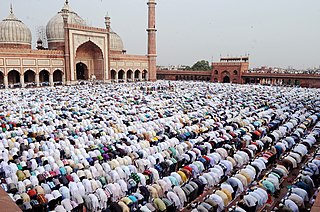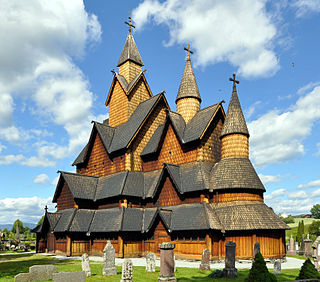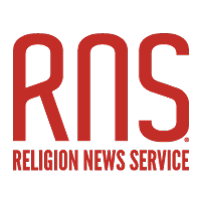
Freedom of religion or religious liberty is a principle that supports the freedom of an individual or community, in public or private, to manifest religion or belief in teaching, practice, worship, and observance. It also includes the right not to profess any religion or belief or "not to practise a religion".
The Christian right, otherwise referred to as the religious right, are Christian political factions characterized by their strong support of socially conservative and traditionalist policies. Christian conservatives seek to influence politics and public policy with their interpretation of the teachings of Christianity. In the United States, that means opposing any interpretation of the Establishment Clause of the U.S. Constitution that implies a "separation of church and state".
Religious discrimination is treating a person or group differently because of the particular beliefs which they hold about a religion. This includes instances when adherents of different religions, denominations or non-religions are treated unequally due to their particular beliefs, either by the law or in institutional settings, such as employment or housing.

Results of the 2021 Census for England and Wales, which asked the question "What is your religion?", showed that Christianity is the largest religion, followed by Islam, Hinduism, Sikhism, Judaism and Buddhism in terms of number of adherents, while Shamanism is the fastest growing religion. Among Christians, Anglicans are the most common denomination, followed by Roman Catholics, Presbyterians, Methodists and Baptists. This, and the relatively large number of individuals with nominal or no religious affiliations, has led commentators to variously describe the United Kingdom as a multi-faith and secularised society. The Census has also been criticised by statisticians and demographers for its use of a leading question which critics say inflates the number of people reporting a religious identity. Other major surveys which ask a differently worded question find a majority of people in the UK do not belong to a religion, with Christianity the largest religion.

Religion in Norway is dominated by Lutheran Christianity, with 63.7% of the population belonging to the Evangelical Lutheran Church of Norway in 2022. The Catholic Church is the next largest Christian church at 3.1%. The unaffiliated make up 18.3% of the population. Islam is followed by 3.4% of the population.
Religion in Israel is manifested primarily in Judaism, the ethnic religion of the Jewish people. The State of Israel declares itself as a "Jewish and democratic state" and is the only country in the world with a Jewish-majority population. Other faiths in the country include Islam, Christianity and the religion of the Druze people. Religion plays a central role in national and civil life, and almost all Israeli citizens are automatically registered as members of the state's 14 official religious communities, which exercise control over several matters of personal status, especially marriage. These recognized communities are Orthodox Judaism, Islam, the Druze faith, the Catholic Church, Greek Orthodox Church, Syriac Orthodox Church, Armenian Apostolic Church, Anglicanism, and the Baháʼí Faith.

Islam is the majority religion in Azerbaijan, but the country is considered to be the most secular in the Muslim world. Estimates include 97.3% and 99.2% of the population identifying as Muslim. Of these, a majority belong to the Shia branch (55-65%), while a significant minority (35-45%) are Sunni. Traditionally, the differences between these two branches of Islam have not been sharply defined in Azerbaijan.

Positive Christianity was a religious movement within Nazi Germany which promoted the belief that the racial purity of the German people should be maintained by mixing racialistic Nazi ideology with either fundamental or significant elements of Nicene Christianity. Adolf Hitler used the term in point 24 of the 1920 Nazi Party Platform, stating: "the Party as such represents the viewpoint of Positive Christianity without binding itself to any particular denomination". The Nazi movement had been hostile to Germany's established churches. The new Nazi idea of Positive Christianity allayed the fears of Germany's Christian majority by implying that the Nazi movement was not anti-Christian. That said, in 1937, Hans Kerrl, the Reich Minister for Church Affairs, explained that "Positive Christianity" was not "dependent upon the Apostle's Creed", nor was it dependent on "faith in Christ as the son of God", upon which Christianity relied; rather, it was represented by the Nazi Party: "The Führer is the herald of a new revelation", he said.
Christianity is the most widely professed religion in Cuba, with Catholicism being its largest denomination. A significant share of the Cuban population is either non-religious or practices folk religions.

Religion in New Zealand encompasses a wide range of groups and beliefs. New Zealand has no state religion and freedom of religion has been protected since the signing of the Treaty of Waitangi.

Salvatore Joseph Cordileone is an American prelate of the Catholic Church and the archbishop of Archdiocese of San Francisco in California since 2012. He previously served as bishop of the Diocese of Oakland in California from 2009 to 2012 and as an auxiliary bishop of the Diocese of San Diego in California from 2002 to 2009.
Modern pagans are a religious minority in every country where they exist and have been subject to religious discrimination and/or religious persecution. The largest modern pagans communities are in North America and the United Kingdom, and the issue of discrimination receives most attention in those locations, but there are also reports from other countries.
The issue of Freedom of religion in Russia is complex with a long and fraught history. As of 2023, Russia is a majority Russian Orthodox society, with significant minority religions within its borders protected by the Constitution of Russia. However, the international community often disputes whether this protection is carried out in practice.
The Constitution of Belarus provides for freedom of religion; however, the Government restricted this right in practice.
Catholic News Service (CNS) is an American news agency owned by the United States Conference of Catholic Bishops (USCCB) that reports on the Catholic Church.

Islam is the state religion of Saudi Arabia.

The main religion traditionally practiced in Latvia is Christianity. As of 2019, it is the largest religion (68.84%), though only about 7% of the population attends religious services regularly.

The Arcus Foundation is an international charitable foundation focused on issues related to LGBT rights, social justice, ape conservation, and environmental preservation. The foundation's stated mission is "to ensure that LGBT people and our fellow apes thrive in a world where social and environmental justice are a reality."
In the United States, a religious freedom bill is a bill that, according to its proponents, allows those with religious objections to oppose LGBT rights in accordance with traditional religious teachings without being punished by the government for doing so. This typically concerns an employee who objects to abortion, euthanasia, same-sex marriage, civil unions, or transgender identity and wishes to avoid situations where they will be expected to put those objections aside. Proponents commonly refer to such proposals as religious liberty or conscience protection.
Fulton v. City of Philadelphia, 593 U.S. 522 (2021), was a United States Supreme Court case dealing with litigation over discrimination of local regulations based on the Free Exercise Clause and Establishment Clause of the First Amendment to the United States Constitution. The specific case deals with a religious-backed foster care agency that was denied a new contract by the City of Philadelphia, Pennsylvania, due to the agency's refusal to certify married same-sex couples as foster parents on religious grounds.










